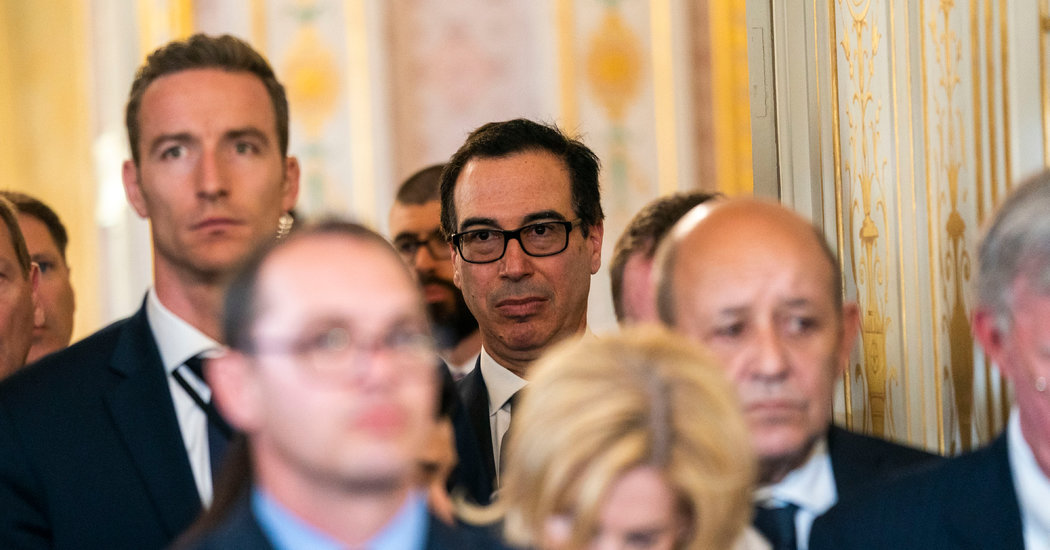FUKUOKA, Japan — An unending trade war between the United States and China. President Trump’s weeklong threat to impose tariffs on Mexico. A potential clash with Europe over cars and agriculture.
Trade disputes spurred by the president’s affinity for employing tariffs as his diplomatic weapon of choice have cast a pall over the global economy as finance ministers gather in Japan for an annual Group of 20 meeting. The weekend of talks, beginning Friday evening in Fukuoka, is expected to be rife with friction as protectionism threatens to slow growth.
“Tension is rising with tariff increases and nontariff measures materializing in many parts of the world,” Taro Aso, Japan’s finance minister, said at an Institute of International Finance conference in Tokyo on Thursday.
A central figure in the discussions will be Steven Mnuchin, the Treasury secretary, who will again seek to reassure ministers from other countries about Mr. Trump’s trade agenda. All eyes will be on Mr. Mnuchin’s scheduled meeting with Yi Gang, the governor of the People’s Bank of China.
It will be the first meeting between senior officials from the two countries since trade negotiations broke down a month ago. Since then, the United States has raised tariff rates on $200 billion of Chinese imports and is considering imposing duties on an additional $300 billion of goods.
The Treasury secretary also has bilateral meetings scheduled with finance ministers and central bank officials from 10 other countries. He is expected to be pressed on the impact Mr. Trump’s tariffs are having on markets and supply chains.
“During Mnuchin’s bilateral meetings, it’s going to be very pointed,” said Mark Sobel, a former senior Treasury official who is now affiliated with the Center for Strategic and International Studies. “Others will express concerns about the global trading system and what it means for the global economy.”
Mr. Mnuchin has accumulated a lot of experience defending Mr. Trump’s provocative policies at global events. Senior Treasury officials said in a briefing this week that agreeing upon a joint statement, or communiqué, could be difficult because countries might not share a common view on trade.
Ahead of the summit meeting, there was little optimism of a major breakthrough with China, because Mr. Trump has hardened his positions and the United States and China have exchanged accusations about who was at fault for the failed negotiations in May.
“As far as China is concerned, China wants to make a deal,” Mr. Trump said this week. “But right now, they’re paying many billions of dollars to the United States.”
American importers pay the cost of the tariffs.
Mr. Trump and President Xi Jinping of China are expected to meet this month at a G-20 leaders summit meeting in Japan. Senior Treasury officials said this week that Mr. Mnuchin had no plans for a trip to Beijing while he was in Asia.
With evidence mounting that the global economy is slowing, Mr. Mnuchin is expected to encourage other countries to cut taxes and roll back regulations to help spur their economies.
In Japan, Mr. Aso expressed concern about Mr. Trump’s tariffs and has called for a multilateral approach to addressing trade imbalances. Mr. Trump recently gave the Japanese government a reprieve from tariffs on automobiles and put off bilateral trade negotiations until after a parliamentary election in Japan.
Prime Minister Shinzo Abe has to make a difficult decision of his own. He has long said that he wants to raise Japan’s consumption tax this fall. But he might delay the increase because of sluggish growth.
This week the World Bank and the International Monetary Fund warned about the prospects of weaker economic growth, and both pointed to trade as a culprit.
“There’s been a tumble in business confidence, a deepening slowdown in global trade and sluggish investment in emerging and developing economies,” said David Malpass, the new World Bank president, who was selected by Mr. Trump.
Christine Lagarde, the managing director of the I.M.F., warned on Wednesday that the recently announced tariffs that the United States and China had put on each other’s imports could reduce global gross domestic product by about 0.3 percent in 2020. When including the tariffs that were already in place, global G.D.P. could be reduced by 0.5 percent, or $455 billion, next year.
“These are self-inflicted wounds that must be avoided,” Ms. Lagarde wrote in a blog post. “The fact is that protectionist measures are not only hurting growth and jobs, but they are also making tradable consumer goods less affordable — and disproportionately harming low-income households.”
The trade wars are also unnerving financial markets. Investors are worried that business investment could stall and that central banks will have to cut interest rates.
At the Institute of International Finance conference, banking executives expressed unease about the trade tensions.
“If you’re a C.E.O., it’s pretty hard to be particularly aggressive and ambitious in making M&A strategic decisions or capital decisions,” said John Waldron, president and chief operating officer of Goldman Sachs. “You have to be much more cautious and a little bit worried right now.”
Mr. Waldron said that the swoon in sentiment started in early May when Mr. Trump tweeted that more China tariffs were coming. He predicted that the best-case scenario was that Mr. Trump and Mr. Xi would restart negotiations.
But Mr. Trump appears to be unfazed by the economic fallout from his confrontational approach with China and others.
“Ultimately this is going to be about Washington making a decision about how it’s going to proceed,” Timothy D. Adams, the president of the institute and a former senior Treasury official, said in an interview. “I think the business community’s voice has become somewhat diluted on these issues and I’m not sure the president cares what the business community thinks.”

